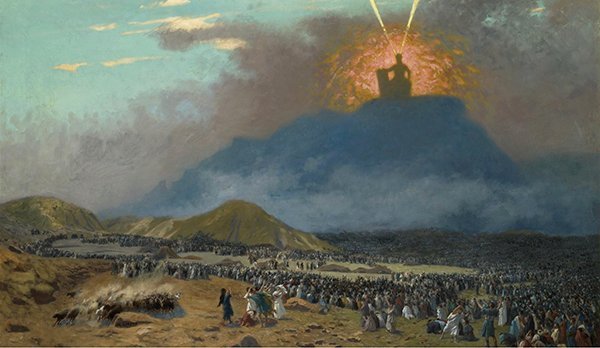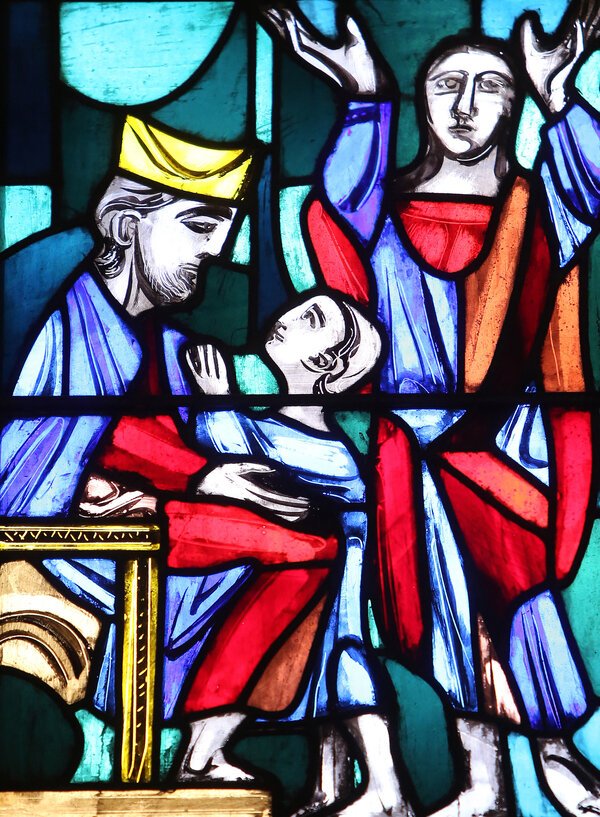10 People in the Bible Who Were Both Humble and Courageous

Peter Paul Rubens (1577–1640), The Meeting of David and Abigail; image from Wikimedia Commons.
Disclosure: This post may contain affiliate links, meaning Beautiful Christian Life LLC may get a commission if you decide to make a purchase through its links, at no cost to you.
Humble and courageous people put others before themselves. They aren’t interested in seeking power for themselves either. While there any many more examples besides those in this list, here are ten people in the Bible who showed both humility and courage in their devotion to loving God and their neighbor.
1. Moses

In Numbers 12 we read how Moses’ own brother and sister, Aaron and Miriam, reviled and slandered him before all of Israel and before the Lord. They attacked Moses and wanted him demoted.
And how did Moses respond? He didn’t; he was as quiet as a docile mouse. Moses didn’t fight for his honor; he didn’t let his pride get wounded and strike out. Instead, he let God defend him. Even though Moses had power and authority, he refused to use the power for himself. He chose to trust in God. And when the Lord punished Miriam, Moses asked for leniency and mercy.
Moses didn’t want his sister to suffer the full brunt of the law. This is meekness which he also showed during the golden calf debacle in Exodus 32. In a just and controlled anger, Moses rightly broke the covenant tablets at the horrible adultery of the people. Meekness is not shy to correct what is wrong; rather, it is bold.
Yet, Moses’ manner of correction was gentle, merciful, and seeking good. When the Lord was going to destroy Israel and told Moses to stand aside, Moses courageously stepped in between to intercede for mercy. Meekness eschews power, especially as the world uses power:
When the cloud removed from over the tent, behold, Miriam was leprous, like snow. And Aaron turned toward Miriam, and behold, she was leprous. And Aaron said to Moses, “Oh, my lord, do not punish us because we have done foolishly and have sinned. Let her not be as one dead, whose flesh is half eaten away when he comes out of his mother’s womb.” And Moses cried to the Lord, “O God, please heal her—please.” (Num. 12:10-13)
If any mere human had a valid claim to be full of pride, it would be Moses. He had the special honor of intimately conversing with God on Mount Sinai and in the tent of meeting (Exod. 33); “the skin of his face shone because he had been talking with God” (Exod. 34:29). Yet, Scripture tells us that “the man Moses was very meek, more than all people who were on the face of the earth” (Num. 12:3).
2. Hannah

Hannah endured much suffering because, “The Lord had closed her womb” (1 Sam. 1:6) She was taunted for years by the other wife of her husband, Peninnah, who did have children (1 Sam. 1:7). When Hannah and her husband Elkanah made their yearly trek to the temple at Shiloh, Hannah prayed to the Lord in her deep distress and bitterness, humbly sharing her heart with him. Hannah was not afraid to boldly ask the Lord to give her a child which he did, namely, the prophet Samuel:
After they had eaten and drunk in Shiloh, Hannah rose. Now Eli the priest was sitting on the seat beside the doorpost of the temple of the Lord. She was deeply distressed and prayed to the Lord and wept bitterly. And she vowed a vow and said, “O Lord of hosts, if you will indeed look on the affliction of your servant and remember me and not forget your servant, but will give to your servant a son, then I will give him to the Lord all the days of his life, and no razor shall touch his head.” As she continued praying before the Lord, Eli observed her mouth. Hannah was speaking in her heart; only her lips moved, and her voice was not heard. Therefore Eli took her to be a drunken woman. And Eli said to her, “How long will you go on being drunk? Put your wine away from you.”But Hannah answered, “No, my lord, I am a woman troubled in spirit. I have drunk neither wine nor strong drink, but I have been pouring out my soul before the Lord. (1 Sam. 1:9–15)
Samuel grew up to become a prophet of God. He anointed Saul and David as kings of Israel and spoke God’s word to the people of Israel.
3. David

In 1 Samuel 24 we read abut how David could have killed Saul in the cave in the wilderness in Engedi, but instead David only quietly cut off a piece of Saul’s robe (1 Sam. 24:4). Saul had been pursuing David for some time in order to kill him. David even felt stricken in his conscience for cutting Saul’s robe because Saul was the Lord’s annointed (1 Sam. 24:5-6). This was David’s big opportunity to end his being pursued by Saul and take the kingdom for himself, but instead David was humble. He called Saul his “Lord and king,” bowed his face, and paid homage to Saul (1 Sam. 24:8):
See, my father, see the corner of your robe in my hand. For by the fact that I cut off the corner of your robe and did not kill you, you may know and see that there is no wrong or treason in my hands. I have not sinned against you, though you hunt my life to take it. May the Lord judge between me and you, may the Lord avenge me against you, but my hand shall not be against you. (1 Sam. 24:11-12)
David eventually did become king of Israel in God’s perfect timing, not his own.
4. Abigail

In 1 Samuel 25:3 we read about Abigail, who was “discerning and beautiful.” Abigail was married to Nabal, a rich man who was “harsh and badly behaved.” David had done a big kindness in looking after Nabal’s shepherds in Carmel and he sent word to Nabal asking for food and drink for his men in return. Nabal, however, thought David’s request was absurd, and he demeaned David. This angered David so much that he set out to kill all the males that belonged to Nabal.
Thankfully, one of the shepherds informed Abigail about all that was taking place, and Abigail immediately went into action—she gathered up generous portions of food and wine for David and his men and traveled with her servants to meet David:
When Abigail saw David, she hurried and got down from the donkey and fell before David on her face and bowed to the ground. (1 Sam. 25:23)
David was not only overwhelmed by the humility and respect Abigail showed toward him, but he was also thankful to Abigail for keeping him from bloodguilt. He obeyed Abigail’s voice, granted her petition, and later married Abigail after the Lord struck Nabal dead soon afterward. Here are some of the words Abigail spoke to David in her petition:
And now let this present that your servant has brought to my lord be given to the young men who follow my lord. Please forgive the trespass of your servant. For the Lord will certainly make my lord a sure house, because my lord is fighting the battles of the Lord, and evil shall not be found in you so long as you live.If men rise up to pursue you and to seek your life, the life of my lord shall be bound in the bundle of the living in the care of the Lord your God. And the lives of your enemies he shall sling out as from the hollow of a sling. (1 Sam. 25:27-29)
Abigail is one of the shining examples in Scripture of what it means to be a godly woman who fears the Lord.
5. Isaiah

In the sixth chapter of the book of Isaiah, we read about Isaiah’s vision of the Lord sitting upon his throne in the temple. Isaiah immediately recognizes his total unworthiness to be in the presence of God and he says the following words:
And I said: “Woe is me! For I am lost; for I am a man of unclean lips, and I dwell in the midst of a people of unclean lips; for my eyes have seen the King, the Lord of hosts!” (Isa. 6:5)
One of God’s seraphim flies over to Isaiah with a burning coal he has taken from the altar with tongs. The seraphim places the coal on Isaiah’s lips so that Isaiah’s guilt will be taken away and his sin atoned for (Isa. 6:6-7).
6. Daniel

The account of Daniel in the lion’s den (Daniel 6) is one of the most beloved passages in the Bible and for good reason: Daniel stood his ground and put obeying God first and foremost. When the people of Judah were living in exile in Babylon, Daniel continued to pray to the Lord daily, even though his enemies tricked King Darius into signing a law that would result in Daniel’s death for doing so. Darius put Daniel into the lion’s den with the hope that Daniel’s God would save him, and God protected Daniel from all harm. The king knew with certainty that Daniel’s God is the living God. The evil plans of the King’s officials and satraps were foiled, and Darius placed all who had sought to destroy Daniel, along with their wives and children, into the den to be destroyed by the lions.
The king declared to Daniel, “O Daniel, servant of the living God, has your God, whom you serve continually, been able to deliver you from the lions?” Then Daniel said to the king, “O king, live forever! My God sent his angel and shut the lions’ mouths, and they have not harmed me, because I was found blameless before him; and also before you, O king, I have done no harm.” Then the king was exceedingly glad, and commanded that Daniel be taken up out of the den. So Daniel was taken up out of the den, and no kind of harm was found on him, because he had trusted in his God. (Daniel 6:20-23)
Instead of trying to defend himself or outsmart the king’s officials and satraps who meant him harm, Daniel continued to worship the Lord, trusting in him alone for salvation.
7. Mary

In Luke 1 we read about how the angel Gabriel appeared to Mary to tell her she would give birth to the “Son of the Most High,” whose kingdom would have no end (Luke 1:26-33). Mary asked the angel how this could be since she was still a virgin:
And the angel answered her, “The Holy Spirit will come upon you, and the power of the Most High will overshadow you; therefore the child to be born will be called holy—the Son of God. And behold, your relative Elizabeth in her old age has also conceived a son, and this is the sixth month with her who was called barren. For nothing will be impossible with God.” And Mary said, “Behold, I am the servant of the Lord; let it be to me according to your word.” And the angel departed from her. (Luke 1:35-38)
Even though Mary was merely a young girl and greatly favored by God, her heart was focused on serving God and honoring him. In a beautiful song of praise known as the Magnificat, she gave thanks to the Lord for being chosen to bear the incarnate Son of God (Luke 1:46–55).
8. Jesus

No one else could ever possess more humility or courage than Jesus. Even though he was God, he willingly humbled himself to be born in the flesh to save us from our guilt and condemnation. Jesus resolutely went to the cross and endured the most terrible torture and humiliation ever, even though he was innocent:
Have this mind among yourselves, which is yours in Christ Jesus, who, though he was in the form of God, did not count equality with God a thing to be grasped, but emptied himself, by taking the form of a servant, being born in the likeness of men. And being found in human form, he humbled himself by becoming obedient to the point of death, even death on a cross. Therefore God has highly exalted him and bestowed on him the name that is above every name, so that at the name of Jesus every knee should bow, in heaven and on earth and under the earth, and every tongue confess that Jesus Christ is Lord, to the glory of God the Father. (Phil. 2:5-11)
Throughout the gospels, we never read about Jesus seeking power for himself. He prayed to the Father to glorify him so that he would bring glory to the Father (John 17:1-5).
9. Peter

When Peter witnessed Jesus’ miracle of the great catch of fish, he knew he was standing in the presence of God and immediately responded with humility:
But when Simon Peter saw it, he fell down at Jesus’ knees, saying, “Depart from me, for I am a sinful man, O Lord.” (Luke 5:8)
Like Peter, we need to realize that there is nothing about us that is untouched by our depraved sin nature and how impossible it is for us to stand before God on our own merits—this is when we run to the foot of the cross and cling to Christ, our only hope.
Sadly, when asked if he was a follower of Jesus on the night of Jesus’ arrest, Peter denied even knowing his Lord not once but three times (Luke 22:54-62). His betrayal of Jesus caused Peter to weep bitterly and is one of the most humbling accounts we find in the Bible. Yet, Jesus forgave Peter and the apostle went on to faithfully preach the gospel boldly at Pentecost (Acts 2:14-41) and to do miracles in Jesus’ name.
10. Paul

Before becoming a Christian, the apostle Paul held a lot of status as a Jew:
Though I myself have reason for confidence in the flesh also. If anyone else thinks he has reason for confidence in the flesh, I have more: circumcised on the eighth day, of the people of Israel, of the tribe of Benjamin, a Hebrew of Hebrews; as to the law, a Pharisee; as to zeal, a persecutor of the church; as to righteousness under the law, blameless. (Phil. 3:4-6)
Yet, after becoming a follower of Christ Jesus, Paul realized that all of these accolades in the eyes of his culture meant nothing:
But whatever gain I had, I counted as loss for the sake of Christ. Indeed, I count everything as loss because of the surpassing worth of knowing Christ Jesus my Lord. For his sake I have suffered the loss of all things and count them as rubbish, in order that I may gain Christ and be found in him, not having a righteousness of my own that comes from the law, but that which comes through faith in Christ, the righteousness from God that depends on faith. (Phil. 3:7-9)
The only thing that mattered to Paul was belonging to Christ, and that is the only thing that should matter to all who have faith in Christ as their Savior.
Do not love the world or the things in the world. If anyone loves the world, the love of the Father is not in him. For all that is in the world—the desires of the flesh and the desires of the eyes and pride of life—is not from the Father but is from the world. And the world is passing away along with its desires, but whoever does the will of God abides forever. (1 John 2:16-17)
This article was originally published on January 4, 2023.
